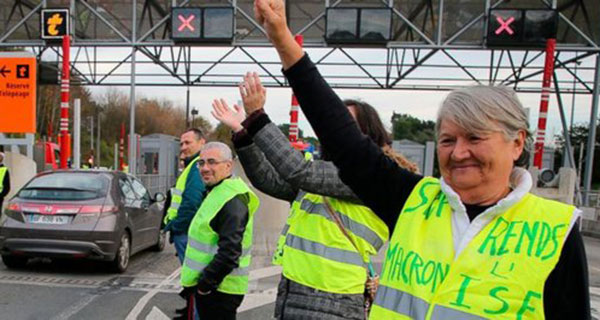 “Canadians do not need to be liberated,” said Canadian Prime Minister Lester B. Pearson half a century ago, after French President Charles De Gaulle lit the fuse for Quebec independence with his famous “Vive la Quebec libre!” speech.
“Canadians do not need to be liberated,” said Canadian Prime Minister Lester B. Pearson half a century ago, after French President Charles De Gaulle lit the fuse for Quebec independence with his famous “Vive la Quebec libre!” speech.
But neither of their current counterparts are standing for national freedom, let alone calling for it.
President Emmanuel Macron chose the anthem of the European Union when he became president, instead of that of the France he came to rule.
And Prime Minister Justin Trudeau has called Canada the world’s first “post-national state.” Both leaders have become United Nations servants, in lock-step with their carbon-taxing, migrant-welcoming agreements.
This has inspired 280,000 yellow-jacketed protesters in France. Canadian protesters have followed suit – and they have every reason to do so.
Consider carbon taxes. In France, a tax is applied to each litre of fuel regardless of price. Since 2014, it has included a carbon tax. From there, a 20 per cent value-added tax is applied to the overall price (including the consumption tax).
The Paris climate accord led to higher fuel taxes in France – especially on diesel, to equalize its price to that of gasoline. This year brought an increase of 7.6 cents per litre on diesel and 3.9 cents on gas. In cents per litre, these taxes were slated to rise another 6.5 and 2.9 respectively – an idea abandoned in an attempt to quell protests.
Canada is almost a carbon copy. Federal and provincial governments place excise taxes on gasoline and diesel at a fixed rate. From here, the Goods and Services Tax is applied to the pump price, plus the excise taxes (yes, a tax on a tax), as do provincial taxes where harmonized. And as Canadians are all too aware, the federal government has mandated carbon taxes across the country, at $20 per tonne of carbon in 2019, increasing annually until $50 in 2022. This will tack 11 more cents on every litre of gas.
The closer one looks, the more the parallels.
French protesters complain that certain industries and big business are being exempted from carbon taxes. Canada has taken the same approach. Starting in 2019, companies that produce 50 megatonnes of carbon dioxide a year were to face penalties, but only for the portion above 80 per cent of the average within their industry. This threshold is 90 per cent for companies operating in Canada that produced cement, iron and steel, lime and nitrogen fertilizers.
Canadian grannies will pay carbon taxes to run their furnace, while 50,000-megatonne carbon producers are mostly exempt.
At the end of November, 72 per cent of French people polled supported the protesters, while 27 per cent supported Macron. Blue-collar workers and rural folks feel especially picked on by carbon taxes. They complain that urban elites don’t care about their practical realities, such as the necessity of driving to work, or that the burden placed on them supposedly to stop climate change was making it hard to get by.
Saskatchewan has led the charge against Canadian carbon taxes for very similar reasons. The province has 40 per cent of Canada’s arable land, but only three per cent of its population, with many blue-collar rural people in farming, mining and oil industries. Many have no choice but to spend hours driving for work, recreation and everyday life.
Some Canadians and French believed that their ‘leaders’ are mere followers of a supra-national agenda, not champions for their electorate.
In Paris, yellow jacket protesters defied barriers around the Tomb of the Unknown soldier to sing the French national anthem. The 42 demands made by protesters include French withdrawal from the European Union and NATO. The EU mandated the acceptance of migrants, with results that do not sit well with many French.
Recently, France and Canada signed the United Nations Compact on Migration. Signatories agree to treat migrants, currently numbering 258 million, as well as their own citizens. The document even calls on national governments to withdraw support for media institutions that oppose this agenda by using non-inclusive language.
Although carbon taxes and migrants have sparked some protests, mass demonstrations that include hundreds of thousands seem unlikely. Canadians tend to be more docile and have no historical precedent of putting their rulers in guillotines.
Besides, yellow jackets are far less copious in the Great White North. France passed a law in 2008 that requires every vehicle have one in the trunk – a piece of bureaucratic largesse that has gloriously backfired. Ottawa can be glad it never made such a regulation.
Unfortunately, when it comes to parallels with Paris, it has done everything else. And the protesters have started to make their presence felt in this country.
Lee Harding is research fellow for the Frontier Centre for Public Policy.
The views, opinions and positions expressed by columnists and contributors are the author’s alone. They do not inherently or expressly reflect the views, opinions and/or positions of our publication.

